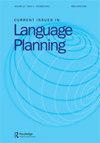建议在韩语水平测试(TOPIK)的背景下采用政策驱动的验证方法
IF 1.8
1区 文学
Q2 EDUCATION & EDUCATIONAL RESEARCH
引用次数: 1
摘要
本研究以韩国语能力测试(TOPIK)为例,提出了一个政策驱动测试开发和验证的概念框架。通过将政策分析和论证结构方面的文献联系起来,说明了政策与测试之间的紧密关系。这就解释了为什么策略驱动的测试开发和实现需要分析多个涉众、内容、上下文和过程。建议的框架将使测试提供者能够在初始阶段调查测试开发和使用的合法性。TOPIK通常是为了社会政治目的,并用于招生和就业目的。今天,它的用途已经扩展到签证发放,永久居留和入籍的目的。因此,假设任何策略驱动测试的合法性都应该根据上下文、后果和可行性进行评估。本文章由计算机程序翻译,如有差异,请以英文原文为准。
Suggesting a policy-driven approach to validation in the context of the Test of Proficiency in Korean (TOPIK)
ABSTRACT This study suggests a conceptual framework for policy-driven test development and validation, using the Test of Proficiency in Korean (TOPIK) as an example context. By linking the literature on policy analysis and argument structure in the validation of testing, the strong relationships between policy and testing are illustrated. This rationalizes why policy-driven test development and implementation require the analysis of multiple stakeholders, content, context, and processes. The suggested framework will enable test providers to investigate the legitimacy of test development and use at the initial stages. The TOPIK was often intended for socio-political purposes, and was utilized for admissions and employment purposes. Today, its use has extended for the purposes of visa issuance, permanent residence, and naturalization. Thus, it is posited that the legitimacy of any policy-driven testing should be evaluated in terms of context, consequence, and feasibility.
求助全文
通过发布文献求助,成功后即可免费获取论文全文。
去求助
来源期刊

Current Issues in Language Planning
Multiple-
CiteScore
4.80
自引率
16.70%
发文量
26
期刊介绍:
The journal Current Issues in Language Planning provides major summative and thematic review studies spanning and focusing the disparate language policy and language planning literature related to: 1) polities and language planning and 2) issues in language planning. The journal publishes four issues per year, two on each subject area. The polity issues describe language policy and planning in various countries/regions/areas around the world, while the issues numbers are thematically based. The Current Issues in Language Planning does not normally accept individual studies falling outside this polity and thematic approach. Polity studies and thematic issues" papers in this journal may be self-nominated or invited contributions from acknowledged experts in the field.
 求助内容:
求助内容: 应助结果提醒方式:
应助结果提醒方式:


